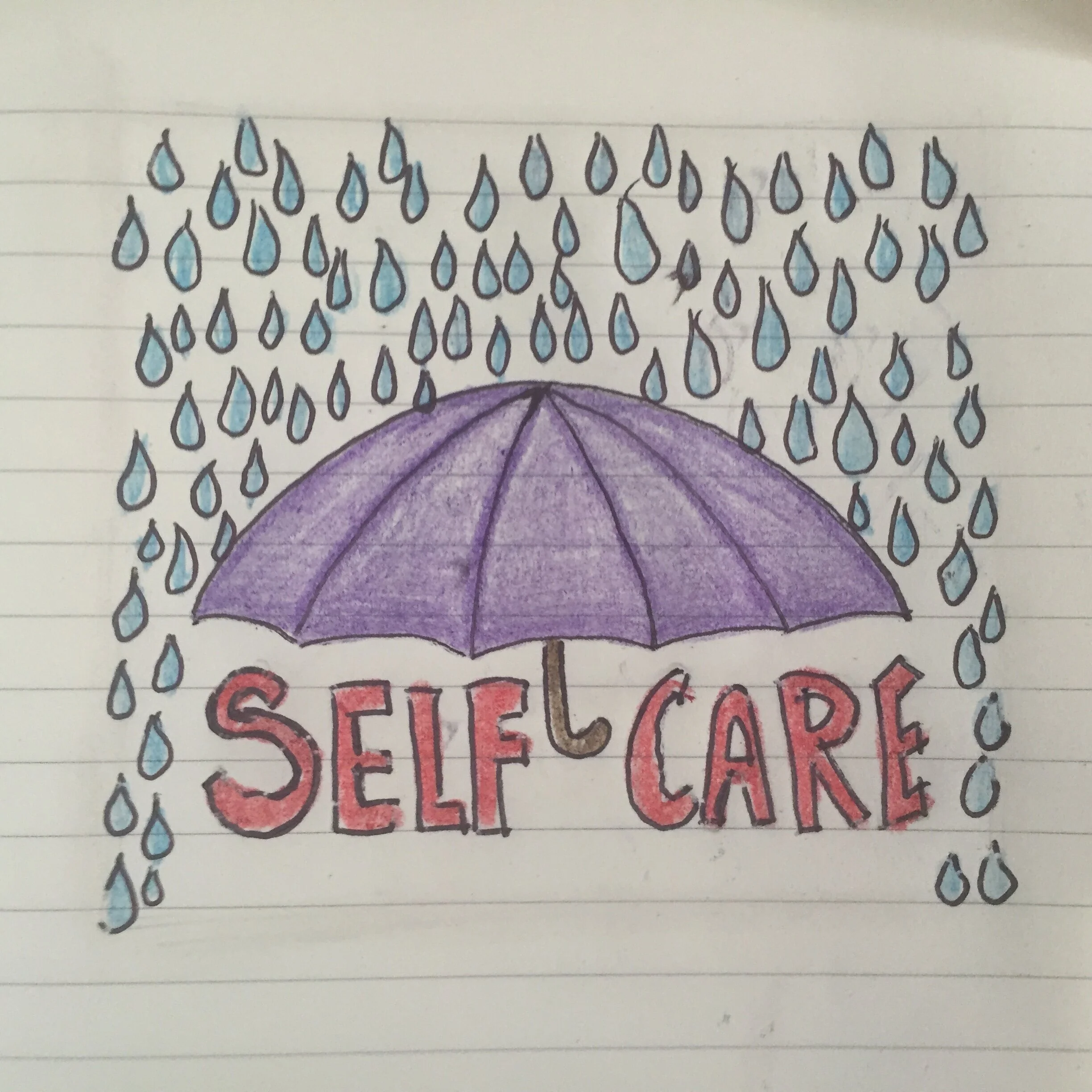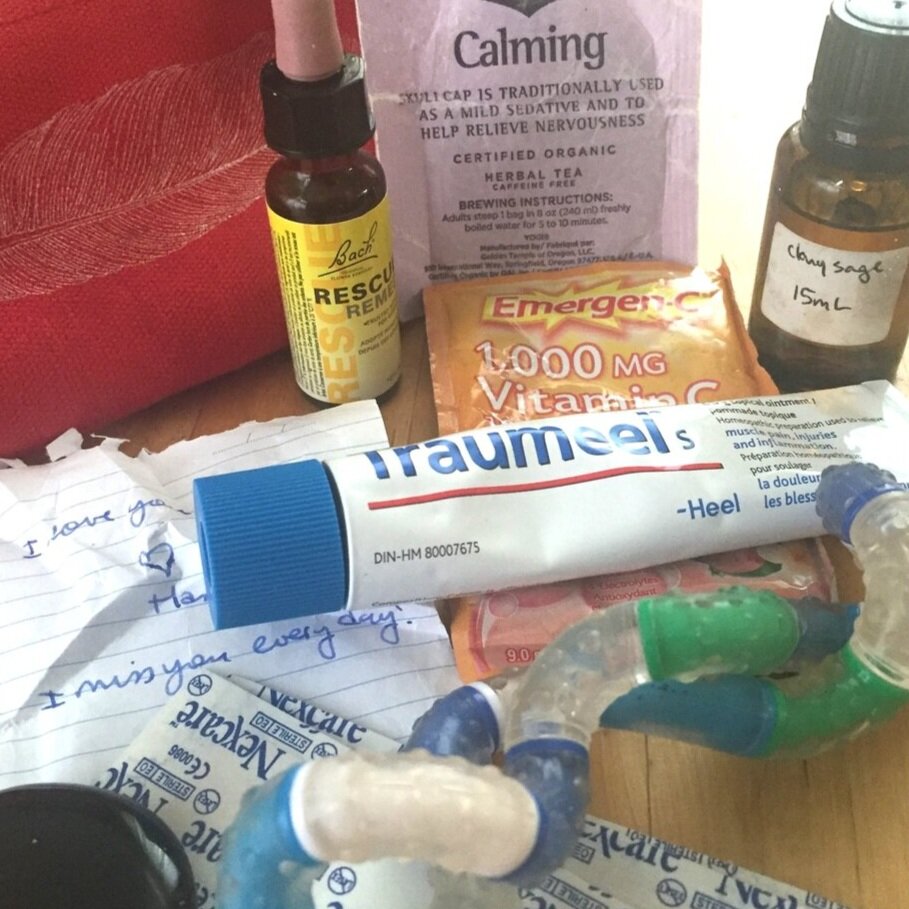Mental Health First Aid Kit
I have clients who come to me because they have days when they feel ungrounded, overwhelmed, sad, anxious, irritable, triggered, keyed up, on edge, or just really “off”. We work together to address the underlying issues: digestion, any nutritional deficiencies, thyroid and adrenal health, hormonal imbalances, etc, while providing some symptomatic relief. Part of this process is exploring ways to cope with these feelings or situations when they happen (which for some people is all the time), but to also find ways to incorporate self-care on easier days that recharges and builds resiliency. The mental first aid or safety kit is an idea developed through brainstorming with clients on ways to feel safer in challenging situations (and I’m sure others have made these kits before).
We often carry items in preparation for a likely event. A first aid kit for camping. Painkillers if you’re a migraine sufferer. Tums if you get heartburn. Benzodiazepines for panic. If you often have days or moments when you or someone you know is just having a really bad moment or day, I would suggest trying to carry some items that might make you feel a little calmer, safer, and more grounded.
I have carried certain items for years but now carry it in one “kit”, as I find it helpful to have an assortment of things to look through for when I or someone I know suddenly has a headache, a scrape, or is feeling mentally/emotionally unstable.
We are all very familiar with the first aid kit: a collection of equipment and supplies used in response to common injuries and emergencies. The purpose of a safety kit is similar, but focuses on our immediate mental/emotional/physical needs for a variety of situations (whether it be wanting a little comfort or needing to get through a crisis situation). This kit is by no means an end-all be-all cure to a bad or disastrous day, but I have found it incredibly useful and empowering in a way that we feel more in control of the situation when we have an assortment of suggestions.
Do you carry anything with you that makes you feel less safer? Have you ever thought of creating a mental health kit? If you were feeling distressed and/or overwhelmed, what would you like to find in it? What would you find useful at a time when we panic and remembering things that have worked in the past becomes challenging?
The following is a list of things I try to carry with me whenever I carry a bag:
Pencil case
To hold all the things together in one easy-to-find place
Rescue Remedy
A blend of 5 flower remedies created for crisis, emergencies, and trauma. For those times we get caught up, but want to relax, calm down, and regain some much needed focus. It doesn’t work for everyone, but is surprisingly effective for a great deal of folks. I have this on hand for times when I or someone I know feels unsettled, shaken, or very upset.
For more information: http://www.bachflower.com/rescue-remedy-information/
Grounding stone
Obsidian: said to be very grounding, healing, and protective. I like it because I find it’s smooth texture and dark glass-like appearance calming.
Hematite: I have found this stone helpful in the past. It is said to dispel negative emotional, stabilize, and ground.
Something that reminds you of someone dear. This can take many forms, but here are a few suggestions:
I have a love note from my best friend.
A small gift that holds meaning to you
A picture of someone you love
A drawing someone made for you
Anything small with sentimental value that will be ok if it gets crushed and thrown around.
A calming essential oil
I like clary sage, as this oil calms anxiety, can help with mental fatigue, and can improve a low mood. Other calming scents include lavender, rose, bergamot, frankincense, or any scent that you find comforting.
Tangle Fidget Toy
It’s quite common to feel a little restless when feeling unbalanced and occupying you hands with something may help calm down the nervous system
Tangle Therapy has been shown to remove minor stress and help with relaxation
For more information: http://www.tanglecreations.com/pages/tangle-therapy
Electrolyte powder
Low amounts of electrolytes can have a negative effect on our mood, make us feel irritable, and aggravate anxiety. I like to have a little electrolyte mix on hand for a dose of vitamins, minerals, and some magnesium during times when I feel a headache come on or when I’m just feeling BLEH. These are often packed with sugar, so I only use them on the rare occasion.
Bag of calming tea
Because why not? Some great calming herbs include: chamomile, lemon balm, passionflower, and skullcap. Making tea also gives you something focus on if that is something you need.
Some basic first-aid items like bandaids, arnica cream, and anything else you feel inspired to include in your kit.
Some additional suggestions and ideas
A list of grounding exercises
Remember activities that make us feel better is challenging when we need them the most. Consider making a list of mental exercising or visualizations that help you feel grounded and calmer. Here are a few suggestions:
Progressive Relaxation
Imagining a chord running through your spine and taking root into the ground below you. Then imagine it growing up into the sky, with it’s branches eventually returning to the earth and connecting with the ends of the roots.
Lie on the floor with your palms face down.
A list of people or services to reach out to or places to go
Friends
Practitioners (MD, psychiatrist, therapist, ND, acupuncturist, herbalist, etc)
Support workers
Small snack
Low blood glucose can cause anxiety or a low mood, so having a little emergency snack that won’t perish in the near future like a granola bar may make a dramatic difference for someday.
Final notes
You may want to carry your kit all the time. A backup plan can make us feel more safe and make the event less likely. Alternatively, it may be something you carry on days you feel more vulnerable or emotional. I have found it particularly useful when supporting other people because I can say “hey, I have a little bag of things that might help, do you want to take a look and see if anything stands out for you?” It may also open up conversations about mental health in ways you wouldn’t expect.
“Caring for myself is not about self-indulgence, it’s about self-preservation and that is an act of political warfare.”
- Audre Lorde
Life today is stressful and there is intense pressure to be productive, busy, competitive, and normative. It’s no wonder many feel angry, on-edge, off-balance. I would suggest being kind and patient with yourself, and remember recovery is a process not a destination. And when it comes to supporting others, let’s try to do it in ways that count: offer support when you are ready to give and be open to rejection. Be careful not to take up too much space (which includes being aware of your privilege) and remember what works for you doesn’t necessarily work for others.


